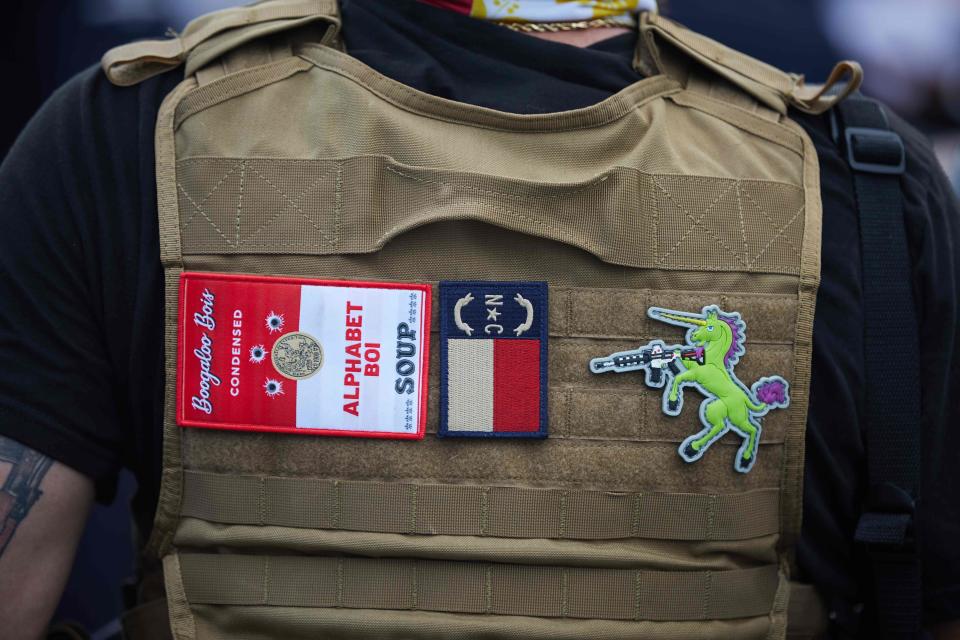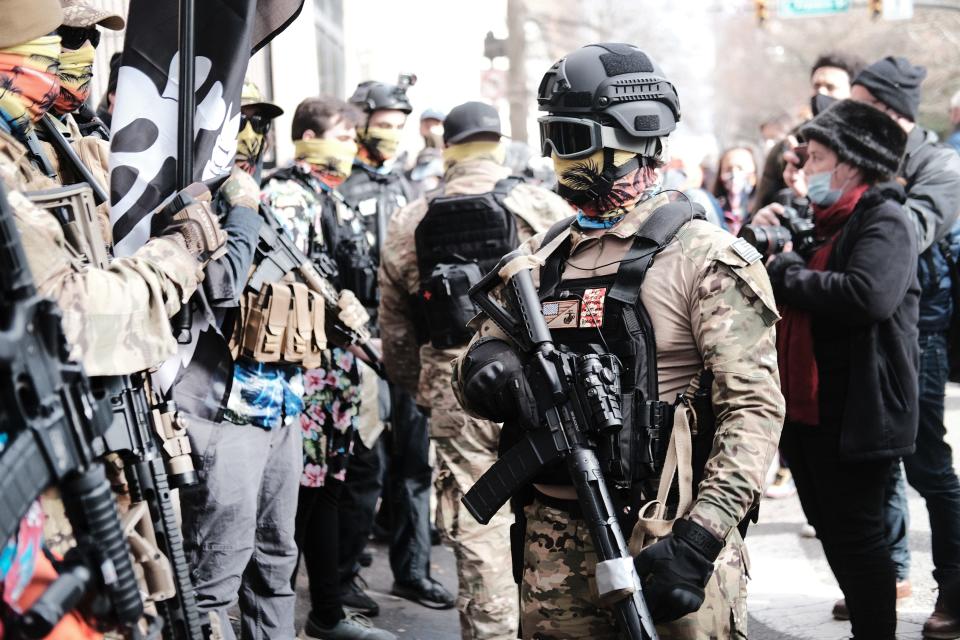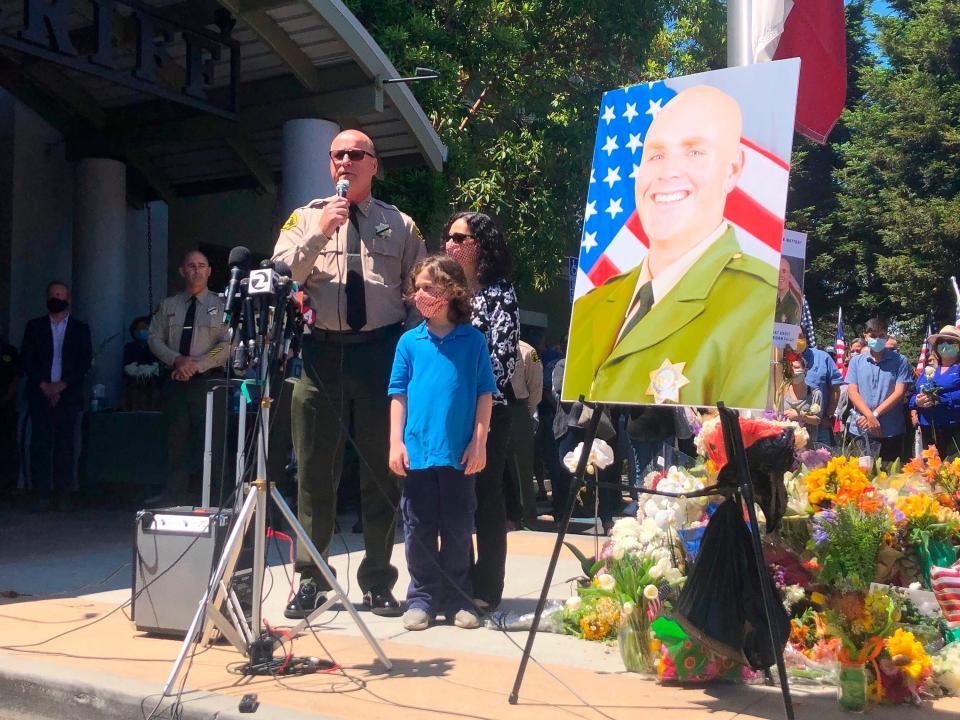Extremist Boogaloo Bois back on Facebook since Mar-a-Lago raid as anger toward feds mounts
- Oops!Something went wrong.Please try again later.
Accounts, pages and groups connected to the violent extremist movement the Boogaloo Bois are resurfacing on Facebook, despite the platform vowing to remove references to the movement more than two years ago.
A new report by the Tech Transparency Project, provided exclusively to USA TODAY, details several Boogaloo-affiliated groups and pages, including one group with more than 4,000 members, popping up on Facebook in recent weeks.
The meme-focused Boogaloo movement, which has at its core a deep distrust and hatred of the federal government, has been tied to dozens of arrests and at least two fatal attacks on police, but the ideology seemed to fade in the wake of the Jan. 6 insurrection last year.
Its resurgence now appears to be connected to the search of former President Donald Trump's Florida home Mar-a-Lago and the ensuing vitriol toward the federal government, said Katie Paul, director of the Tech Transparency Project, a nonprofit watchdog group that monitors large tech companies.
More: Threats toward FBI, law enforcement were already on the rise. Then came Mar-a-Lago
More: Twitter banned the Proud Boys, but they're still there
Paul, who has tracked Boogaloo activity on social media since its inception, said the movement thrives on events that spur civil disobedience and animosity toward the government.
The movement flourished during the anti-lockdown movement at the start of the COVID-19 pandemic, Paul said. It flared up again after the murder of George Floyd and the ensuing protests. And now, as Trump and his supporters post on social media about conspiracy theories and threats against the federal government are spiking, the Boogaloo meme machine is revving up again.
"Any attempt to subvert authority they see as an opportunity to recruit for their movement," Paul said. "Now we see, once again, another major movement that involves a lot of anger toward authorities and real-world attacks – and it's yet another opportunity for the movement to capitalize on."

An ideology born from a meme
Even for experts in extremism, the "Boogaloo," "Boogaloo Boy" or "Boogaloo Boi" movement has always been tough to accurately describe.
Essentially, it's a leaderless, mainly online phenomenon, driven by a heavy emphasis on specific memes, iconography and in-jokes. Central to the movement is an anti-federal government ideology, an anticipation of a second civil war and an obsession with firearms.
Perhaps the most visible example of Boogaloo iconography is the Hawaiian shirts some adherents to the movement wear to protests like the annual pro-Second Amendment rally in Richmond, Virginia, which attracts thousands of armed demonstrators.
In an attempt to avoid detection on social media, Boogaloo adherents often use coded language. Examples include "Big Igloo" or "Big Luau" in place of Boogaloo. The "Big Luau" term is the origin of the Hawaiian shirt motif.

Other easily recognizable memes used by the movement include the "Boogaloo flag," which depicts an image of an igloo, and sometimes a palm tree, with black-and-white stripes mirroring the American flag. In a poke at the pro-law-enforcement "thin blue line" flag, one of the strips in the Boogaloo flag has a Hawaiian shirt pattern.
The "Boogaloo" reference itself emerged from a meme popular on 4chan that was meant to denote "any kind of sequel or subsequent installment in a series," according to the Center for Strategic and International Studies. The meme eventually evolved into "Civil War 2: Electric Boogaloo," a play on the 1984 film "Breakin' 2: Electric Boogaloo."
More: How Second Amendment activism can be a gateway to extremist ideologies
The in-jokes turned sour through 2020 and 2021 as members of several Boogaloo-affiliated groups were arrested on charges including conspiracy and terrorism.
In May 2020, Air Force Sgt. Steven Carrillo shot and killed a federal officer guarding the U.S. Courthouse in Oakland, California. Days later, after a manhunt, Carrillo also killed a local deputy in a shootout in California's Santa Cruz Mountains. During that attack he scrawled phrases tied to the Boogaloo movement in his own blood on the hood of a car he allegedly hijacked.

The movement's resurgence is taking place on what Paul says is the Boogaloos' favorite platform: Facebook.
Facebook pages and groups growing
The Tech Transparency Project found a surge in pages and groups using Boogaloo iconography since early August.
One such group, Bigaloo Bogaloo, had more than 4,000 members as of Tuesday afternoon. The group, launched in April, saw a flood of new members in the past two weeks, adding more than 700 members from Aug. 25 to Sept. 6, according to the Tech Transparency Project.
That might not sound like a lot of people, but for a Facebook group operating in a clandestine way and trying to avoid detection, it's a significant presence, said Megan Squire, a research fellow with the Southern Poverty Law Center who has tracked extremists online for years.
"I would report a group with four members," Squire said. "None of this should be out there. Anyone could stumble on this stuff, especially with a keyword or a suggestion from the algorithm."
Paul said the Boogaloo movement has always preferred Facebook to newer social media sites that may be more open to extremist content like Gab or Trump's Truth Social. She cited a recent post on one Boogaloo group that reads: "people rather do blood oaths than move to Gab.”
But maintaining a presence on the world's largest social media site requires avoiding the social media giant's detection.
Flourishing despite a ban on Facebook
In June 2020, after the Carrillo shootings, Facebook officially banned members of the Boogaloo movement who "actively seek to commit violence." The Boogaloo movement also appeared on an internal Facebook list of "dangerous individuals and organizations" obtained by The Intercept last year. (The document also notes that only a subset of the movement is banned.)
The Boogaloo groups and pages identified by the Tech Transparency Project include examples of people sharing violent memes directed at the federal government. Posters share conspiracy theories and spread Hawaiian-shirt-themed propaganda. Group members also share bombmaking information and post threats directed at the federal government.
It's exactly the subset of the Boogaloo movement that is supposed to be banned on Facebook, Paul said.
The Boogaloo pages, groups and accounts have been able to flourish on Facebook despite the company's assurances it is doing all it can to keep extremists from using the platform.
"We continue investing heavily in people, technology, research and partnerships to counter extremist activity and keep people and communities safe," a spokesperson for Meta, Facebook's parent company, said in a written statement to USA TODAY. "This is an adversarial space, with perpetrators constantly trying to find new ways to evade our policies, which is why we work with a number of organizations to flag content and stay ahead of evolving trends."
Meta, which has a current market capitalization of $426 billion, did not elaborate on how it monitors the the simple semantic tweaks Boogaloo adherents regularly use to avoid detection. By contrast, small organizations like the Tech Transparency Project can quickly and simply spot those changes.
The "Bigaloo Bogaloo" group is a good example. The group's 4,000 members were able to find and join a group devoted to the Boogaloo ideology, despite some minor spelling "camouflage" in its title.
This sort of semantic subterfuge is exactly why social media companies like Facebook need a devoted team of researchers that can track extremist movements as they grow organically, said the SPLC's Squire, who is also a computer scientist.
"The landscape changes too quickly," Squire said. "You cannot substitute an algorithm for expertise. You just can't.
"And I'm saying that as a person who was a computer scientist trained to literally make algorithms," Squire added. "I realized that what I was trying to do in an automated fashion would never work, at least not in my lifetime, so I had to become an expert."
The Meta statement also criticized the Tech Transparency Project for not sharing its findings with the company before publishing its report.
"If TTP were really interested in keeping this kind of violent content off of the internet, they’d share their research with us rather than just trying to generate headlines," the statement reads.
But Paul also pointed out that despite years of identifying violent extremist content on Facebook, the social media giant has never once reached out to the Tech Transparency Project for help. She echoed other researchers who said it's difficult to know how to reach out to Facebook to offer to help identify or to flag troublesome groups.
"Nor should it be on researchers or journalists to clean up the world's most profitable social media platform," Paul said. "They should be investing those profits in doing it effectively."
This article originally appeared on USA TODAY: Boogaloo Bois: What the ideology means and why it's back on Facebook

